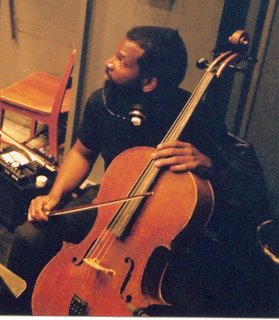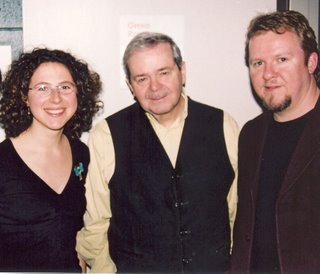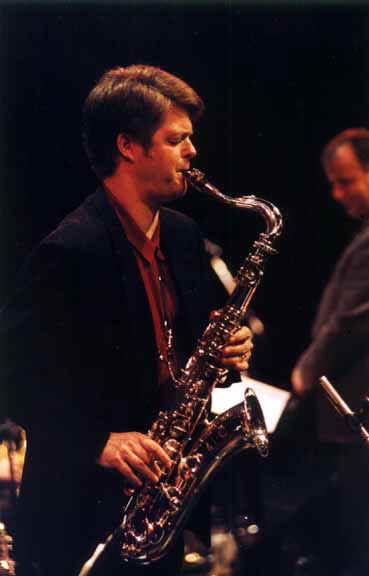I've arrived at the Banff Centre, but first I have to backtrack one more time.
In 2004, when I learned that Kenny Wheeler would be the guest artist, I again applied to go, expecting that there would be some stiff competiton for a spot in the orchestra, and I was right. I was advised by Registration that I could only attend as an audit.
I cornered Hugh at the Cellar after a Bonehenge gig to discuss the implications of auditing. Typically he told me that I just have to come, there would be lots of chances for me to play and that I would have the opportunity to present another composition. I was still unsure, and maybe part of that was fear of what sort of payback Mike Herriott would exact on me for The Joke. Hugh was insistent and added that I had to come because there would be a bassist/cellist from Seattle who was also into new music and it would be worthwhile for me to meet him.
 I dithered for a while, but I knew this would be a rare opportunity to work with Kenny, so what the hell, I went for it. I weathered the annual financial strains and made my way up there.
I dithered for a while, but I knew this would be a rare opportunity to work with Kenny, so what the hell, I went for it. I weathered the annual financial strains and made my way up there.I took the shuttle bus from the Calgary airport to Banff with a fresh-faced young guitarist named Perry Smith up from Los Angeles. He was attending USC and I knew one of his profs, Shelley Berg. Shelley is a scarily brilliant pianist and we have regularly hired him to adjudicate at the Kiwanis Music Festival. So Perry and I had a starting point for conversation which helped the drive pass quickly.
The first evening I was there, we had an impromptu jam session in one of the practice rooms. Not too far along, we went from playing standards to more freely improvising, something I couldn't have paid the orchestra members to do in the first couple of years I was there. There were three of us who were nudging the group in this direction, the aforementioned Paul Rucker from Seattle, pianist Marianne Trudel from Montreal and myself. I knew we had an instant chemistry. It also turned out that the three of us were intending to present compositions for the orchestra. I felt things were off to a good start.
We started into repertoire the next morning. Normally a big band sax section consists of 5 saxes - 2 altos, 2 tenors and 2 baris. I was sax #6. I was thrilled that my second cousin Jennifer Bell was on lead alto. It was her turn to come up while husband Bill Mahar stayed home with the kids. Kent Sangster had the lead tenor chair, and I shared the second tenor chair with a young phenom from New York, Mike Kammers. This guy could really play like hell and he had all of the swagger that an up-and-coming Big Apple hotshot would be expected to have. I don't think he ever warmed up to the idea of sharing the chair with me, but it didn't really bother me. He got most of the solos (as he deserved) and if the music called for a more delicate voicing, I had no problems laying out.
The first several days went quite smoothly. I kept looking over my shoulder for swift retribution from Mike Herriott, but surprisingly it never came. Mike was focussed on the business at hand, namely the music.
I didn't really commit to writing a piece until I arrived there. I knew I couldn't pass up the opportunity, especially once I saw what Paul was writing. I had three days to pull it together, I had been tossing some ideas around in my head ever since my success the previous year. Of particular interest to me was the challenge of writing a largely improvisatory piece that still sounded as esthetically beautiful as some of the things I had done two years earlier with Maria Schneider. It's really easy to do ugly with free music, much harder to sound pretty but not new-agey.
I had started thinking about the piece a year earlier, as soon as I had presented my initial offering at Banff. I generally leave ideas to percolate for a long time, then the actual writing process has generally come relatively quickly. I am not a prolific composer. I give a lot of thought to which concepts to explore, experiences to draw upon, and the overall architecture of the piece. I decided to preface the the "pretty" section with something more toward the ugly end of the spectrum, so there would would be a real contrast. I also decided to emulate Hugh's favoured Fibonacci series to have a mathematical formula govern certain facets of the piece, particulary the relative length of the sections, and how many changes there were in any given section.
So my second Banff piece actually came together pretty quickly. What really took a lot of time is transferring the musical ideas and directions to graphic form on paper. I use a combination of standard notation and images. This involves a certain ability with Finale and Photoshop and usually several other software programs. One thing I have taken from Barry Guy is the desire to have the final score look as good as possible. His scores are often worthy of framing and hanging on your wall.
I decided that the use of conduction, the cueing of improvisation through a series of preset hand signals would be a big part of the piece. That gives me the opportunity to create spontaneous shifts in the music, reacting to what I hear and building on it. I owe a debt of gratitude to Coat Cook for really schooling me in this technique. I made sure to come up with some new signals of my own for the piece, to add to the growing conduction vocabulary.
All three of the pieces presented by Marianne, Paul and myself ended getting recorded in the Telus studio by the orchestra. I could never have afforded to mount such an exercise on my own. I was really pleased how my piece came out - the members of the orchestra were so open to new ideas and responded so musically that it had to sound great.
An unexpected highlight - Toronto-based guitarist Dave Occipinti was doing a residency at Banff, just working on his own stuff. One of the amazing things that took place was the connection between Dave and Perry Smith, the guy I had taken the shuttle with. These two decided to play together at a performance at the makeshift on-campus jazz club. These two guys connected instantly in a telepathic way. Perry was no goofy kid, he was a seriously heavy player, and he and Dave immediately sounded like guys who had been playing together for years. They would launch into a standard and take it through dozens of twists and turns, often finishing each other's phrases, and pushing each other to greater heights. It brought the place to a standstill, with a room full of jaded jazzers just standing there with their mouths hanging open. It was a phenomenal occurrence and the people who saw it are still talking about it.
Then there was Kenny Wheeler. I don't know if I can be brief discussing that experience.
First off, Kenny was into his seventies and he was recovering from a fairly serious stroke. Many of us had a great fear for his well-being and were concerned that this may indeed be the last time he may come back to Canada. It felt like a great responsibility to honour him by playing his music as best we possibly could.
He didn't have a strong voice. He led the band by sitting in a chair and would turn and say something in a soft voice to Hugh, who would relay the instruction. Kenny is self-effacing to a fault at the best of times and this was an interesting lesson in leadership. We would hang on every word and then to our utmost to carry out his wishes. I think he could have ordered us to march off the peak of Tunnel Mountain and we would have done it for him. He had a very dry wit, painfully self-effacing and absolutely wonderful to work with. It was such an honour to be there.
Kenny's music is absolutely beautiful and extremely demanding. It is truly original. The jazz world has yet to give him the recognition he truly deserves.
In truth, despite our best efforts, rehearsals leading up to the final concert were not going well. At one point Mike Herriott blew up at the band, trying to get us to play better. Hugh also cracked down one day. It was shocking because he usually leads the band in a jovial, almost goofy way, all the while encouraging us to dig deeper. This particular day, he simply read the riot act. It was what had to be done in order to protect the integrity of the music. It wasn't a fun thing to go through, but it was a serious lesson in true professionalism.
One casualty of that crackdown was that just before the concert, Hugh reassigned the solo that I had been given in a tune of Kenny's called Kayak. I will freely admit that I had been struggling with the changes, but I had been working hard on it and thought I could pull it off in concert. It hurt because I was thinking of it as my offering to Kenny, and it had been taken away. Rationally I know I would have done the same thing had I been in Hugh's shoes. I had not shown in rehearsal that I could handle it. Hugh asked bari sax player Ken Hoffman to take it that evening.
Ken and I had sat beside each other throughout the program and we got along great. The concert went really well and it came time for that solo. As Ken got up to blow, he said to me "This one's for you, buddy." I damn near lost it on the spot. We never had spoken a word about it, but he knew how I was feeling. I considered it an incredible act of friendship. It was an unexpected blessing that I received that year at Banff.
Here's Marianne Trudel, Kenny and Mike Herriott in the green room just before our show.

Just to add to the intensity of the program that year, Andy Sheppard had brought his CBC-FM radio program to Banff, and he prepared his broadcasts all week from one of the practice rooms. Andy hung out with the band a lot and really did his best to relay the special nature of this place and how it affected the participants. He broadcast an interview with me, along with some of the other musicians. He asked me to request a piece to air and I asked for Maria Schneider's Hang Gliding. He said Michelle Gregoire had also requested it. Together, we turned Andy onto Maria, whose music he had not been familiar with.
CBC also recorded some of the Kenny Wheeler conert, for broadcast on After Hours. We were expecting that an excerpt of no more than two minutes would be broadcast, with the music being background to Andy's voiceover. That way it was possible to get around musicians union regulations and we wouldn't get paid. No releases were signed as a result.
The shit hit the fan big time the following week when all 15 minutes of our performance of Gentle Piece was broadcast on national radio. A couple of weeks worth of increasingly angry open e-mails between band members and the CBC ensued. Cousin Jen let especially them have it with both barrels - I made a mental note never to piss her off, even if she was family. Eventually we all got properly paid for the performance, not a particularly great sum. I was happy to get anything - this was one of the tunes that was fairly delicately arranged, so I sat out. Two second tenor saxes would have upset the balance. Technically, I was part of the performance as I was onstage, but I never played a note. I played every tune that night except this particular one. This is the first time I've come clean about this. The CBC cops will probably kick my door down some night and shake me down for the few bucks I got.
The producers of the show claimed it was all an innocent misunderstanding, but I personally have the totally unsubstantiated belief that it was done on purpose. It was a very important concert in the sense that given Kenny's poor health, it could well have been that last time he performed a complete concert of his large ensemble compositions on Canadian soil. We all certainly felt that was a possiblity and there was a slight melancholy feeling in the air as a result.
Happily I saw Kenny perform last month in Vancouver with Hugh, Cam Ryga and the CBC Vancouver Radio Orchestra, doing the premiere of Hugh's Primary Colours. Kenny's health was better but he was noticeably older and had slowed down a step or two. He autographed my copy of the Banff recording of that fateful evening.
The other thing that came out of that was a musical relationship between Paul Rucker, Marianne Trudel and myself. We've played in various combinations together in the ensuing two years. Every time has been very special and fabulous music has been created. I am part of the Paul Rucker Large Ensemble, an orchestra he formed as soon as he got back from Banff. I have watched him model some of Hugh's leadership style. The Ensemble had an immediate impact in Seattle and has helped Paul win a number of awards and vaulted his career to great levels.
Shameless plug: Paul, Marianne, Clyde Reed, Carol Sawyer and I will be playing at the Cellar in Vancouver on May 29th. This lineup was a featured group at last year's Northwest Free Jazz Festival in Seattle, and was simply one of the best gigs I have ever been part of. I do expect lightning to strike again at the Cellar.
Hugh had encouraged me to go to Banff that year to meet Paul. I hate it when he's so right.

No comments:
Post a Comment